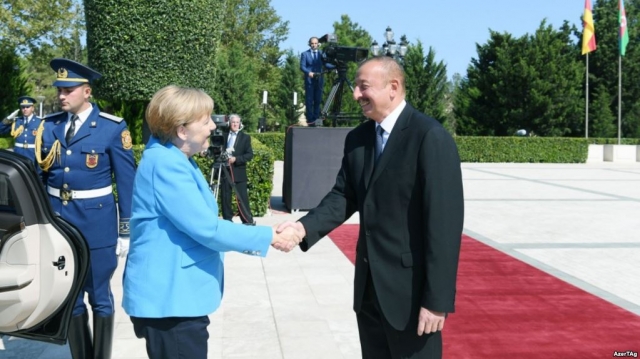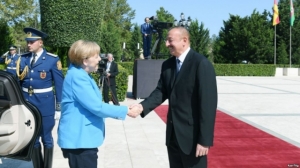Azerbaijan Lukewarm on Merkel’s Visit
After her day and a half visit to Georgia last week, German Chancellor Angela Merkel continued on to Armenia, then Azerbaijan.
She spent less than a day in Azerbaijan on August 25, which included a private meeting with President Ilham Aliyev and a subsequent joint press conference.
While her visit to Armenia had the least political complications, she faced high expectations in both Georgia and Azerbaijan.
There was speculation before the trip that one of Merkel’s motives was to explore possible alternative gas supply routes that could reduce Germany’s dependence on Russia. In Baku, she spoke with Aliyev about the issue, and others, including touching on human rights concerns in the country. Merkel noted Azerbaijan’s importance to the European Union for diversifying its energy supply and called on Azerbaijan to diversify its own economy.
After her visit, an article in Jam News suggested that Azeris were disappointed with Merkel. Most notably, the Chancellor declined to comment on Azerbaijan’s territorial integrity. Approximately 20% of Azerbaijani territory is currently occupied by the self-declared "Republic of Artsakh,” which is economically and militarily backed by neighboring Armenia – the same percentage of Georgian territory that is illegally occupied by Russian forces in Abkhazia and so-called South Ossetia. While in Tbilisi, Merkel took questions from students at Tbilisi State University. When asked why she had not used the term ‘occupation’ regarding Georgia, she responded “Yes, it is an occupation – an occupied territory. I said that this is an occupation, a seized territory of 20 per cent, and that it remains a huge injustice” – students applauded the statement. In Azerbaijan, there was no such declaration regarding the disputed Nagorno-Karabakh region.
Adding to the political tension was the story of German MP Albert Weiler who entered into Nagorno Karabakh in 2014 and 2016 from Armenia and was thus declared “persona non grata” and not allowed to join the German delegation, as planned.
The visit may also have been a disappoint to the German side, as a prepared agreement on the export of Azerbaijani natural gas to Germany and other EU countries was not signed.
Although their territorial integrity was defended by the German leader, articles in Georgia Today and Eurasianet suggested that Georgians may also have been left somewhat unenthused. Merkel did not endorse Georgia’s goal to join the European Union.
By Samantha Guthrie
Photo: RFE/RL
Related Stories:
People React to Merkel’s Visit: “I want deeds, not words”
Merkel’s Visit to South Caucasus in a Nutshell












